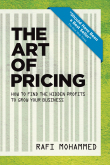What is the Value of Green?
It’s common for managers to declare, “We offer a great deal of value but customers aren’t willing to pay for it.” Well in my book (literally), value must equate to an increased willingness to pay.
Sidebar story: a few years ago I conducted a workshop for a manufacturer that produced a variety of plastic outdoor household items. The manager of the most popular division confidently stated that his prices were the best that could be charged and he was fully capturing the value of his product line. Congratulating him, I suggested that we quickly review the value of his products “for the heck of it.” Interestingly, one of the key value attributes that we unearthed was that the company manufactured its products in the U.S. whereas rivals were located abroad. Given the target audience, everyone agreed that we could raise price by 5% simply because of this “Made in America” attribute. Makes sense doesn’t it? I certainly am willing to pay such a premium as it makes me feel better (that’s value…).
The term “green” is popularly bantered about these days. My question to you is whether green is a “feel good” attribute or one that consumers will actually pay for?
For instance, a long-time friend is helping his son with his lawn mowing service this summer. Interestingly, a key differentiation of their service (relative to other neighborhood kids/lawn services) is a sharp focus on being eco-friendly. Remember those old lawnmowers that had blades which churned when you pushed the mower (thus, no gas engine). These entrepreneurial kids are using an updated version which claims a litany of benefits to homeowners such as: no gas emissions, enhanced lawn moisture, and reduced pests/disease.
So my questions to you are as follows: (1) Are you willing to pay a premium for products that are greener than rivals? (2) If these neighborhood kids showed up at your front door pitching their eco-friendly services, how much, if any, premium would you pay relative to your next best alternatives (other mowing services)?
On another note, many thanks to Russ Banham for including me in his recent CFO Magazine article “The Price is (More) Right.”
Readers' Comments on This Blog Entry
I must disagree with Ross. IMHO, if someone "tends to", he must be willing to pay something more (coeteris paribus). If he does not want to pay more, he does not "tend to", it is just an expression. I point this out because I am sure that most people would pay at least a couple percentage points more (depending on the total price, obviously) for ecofriendly products. I think it depends on the grade of "ecofriendlyness". In this lawn mowing service I would be CLEARLY asking for a higher price: at least 20%. This would lead to the "salesperson" having to explain or show off the benefits to the ecosystem with more energy. A smaller difference could be explained by not so important reasons.
To get the the average consumer to pay extra for the value of green you have to show them the clear benefits. Either financial or "feel good". Then I believe they will pay extra.
I think it depends on the type of clientele you are targeting. I would think if you have the right target audience who buys "green products," they are likely to pay the premium. For instance, green toilet paper, detergents...etc are usually more expensive over their "not green" alternatives. Or people who choose Organic Food, they are likely to pay a hefty premium over the others. So I think it depends on the neighborhood then he can determine if there is any premium to be applied.





I would tend to choose a product that is eco-friendly over an alternative that is not, but I'm not sure I'd pay extra for it.